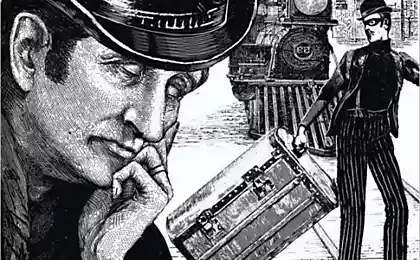783
"Suffered garbage - proshlyapili bohemia"
To become better acquainted with the words that you use all zhizn.Zhurnal Maxim introduced the fascinating and surprising story of the origin of the famous winged words and expressions.
"Proshlyapil" This word, as well as the phrase "Hey, the hat!" Has nothing to do with hats, spineless intellectuals and other standard images that arise in our mind with you. The word is it in the vernacular speech straight from the Yiddish and a warped form of the German verb «schlafen» - «to sleep." A "hat", respectively, "Sonia razzyava." While you're here hats your suitcase drapes.
"Nonsense"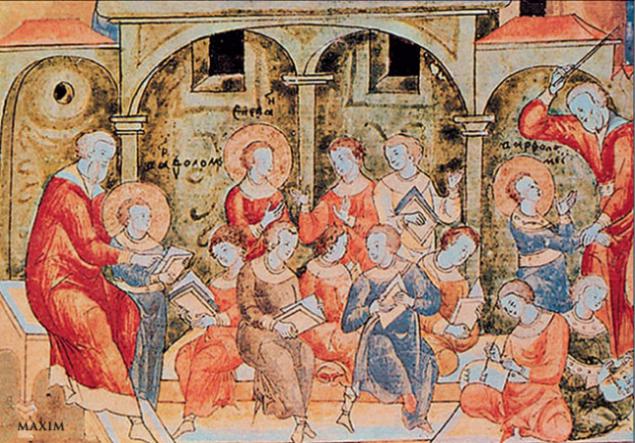
seminarians studying Latin grammar, it had serious scores. Take, for example, the gerund - a member of this venerable grammatical community, which in Russian is simply no.
Gerund - a cross between a noun and a verb, and the use of this form requires a knowledge of Latin in such a large number of rules and conditions, often straight from seminary studies carried off to the hospital with a brain fever. Instead seminarians became known as "nonsense" any boring, tedious and utterly vague nonsense.
"Nepuganye idiot" Most people suffering from congenital idiocy, have a feature that happy that they are difficult to scare (and to convince to use a spoon and buttoning his pants). Painfully staunchly they do not want to absorb any information from the outside.
The expression went for a walk with a light hand of Ilf and Petrov, who in his "Notebooks" enriched the world of aphorisms "Edge not frightened idiots. It's time to scare. " This name writers parodied a then very popular book Prishvina "In the land not frightened birds».
Incidentally, the word "idiot" is also a delightful origin. Two and a half thousand years ago in Greece "idiot" at public meetings were called polite citizens who are not engaged in politics, did not belong to any party, and led a quiet peaceful life. How much has changed since then.
"The Moor has done his work, the Moor can go" Somehow, most people (even those who have actually read Shakespeare) believe that these words belong to Othello strangled his Desdemona. In fact, Shakespeare's hero was someone else, but not a cynic, he probably would have hanged himself himself than blurt out such tactless over the corpse of his beloved.
The phrase that says another theater Moor - the hero of the play by Schiller "conspiracy Fiesco in Genoa." He helped the Moor conspirators to gain power, and after the victory realized that yesterday's colleagues do not care about his high bell tower of the Genoese.
"Casting pearls before swine"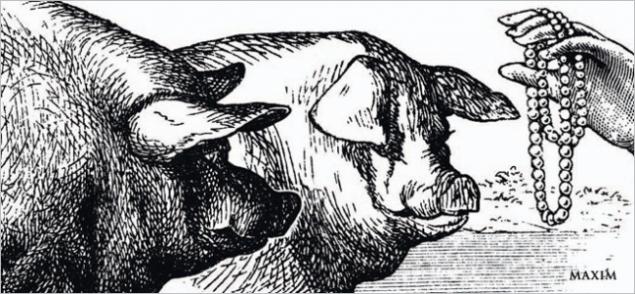
The process of throwing rubbish in front of small glass pig - really a perfect idea in its senselessness. But in the original text of the Bible, from which scratched the phrase, neither of which beads out of the question. It says something about the people who drop in feeder pigs a precious pearl. Just once the word "gem", "beads" and "Pearl" is meant pearls, its different varieties. It is then pricked industry churning penny glass beads and called them beautiful word "beads».
"With a twist"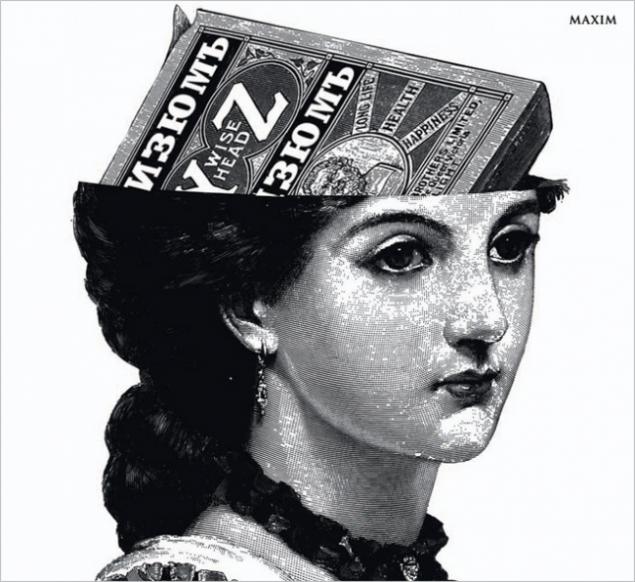
The image highlights - some little tidbits, which gives a sense of the severity and unusual - gave us personally Leo Tolstoy. It was he who first introduced into circulation the phrase "a woman with a twist." In his drama "The Living Corpse" one character says to another: "My wife was the perfect woman ... But what do you say? There were highlights - you know, in kvass highlight? - There was no play in life ».
"Last warning" If you were born before 1960, then you yourself well remember the origin of this expression, for it is never forgotten. But later generations have been deprived of happiness to watch the confrontation between the US and China at the turn of 50-60-ies of XX century.
When in 1958 China, angered by the fact that the US air force and navy support Taiwan, published an angry note, titled "The Last Warning", the world shuddered with horror and held his breath in anticipation of the third world. When seven years later, China has four published a note under the same name, the world howled with delight. Since, in addition to pieces of paper with the terrible words, China had nothing to oppose US, Taiwan still retained independence, which Beijing does not recognize so far.
"For sure"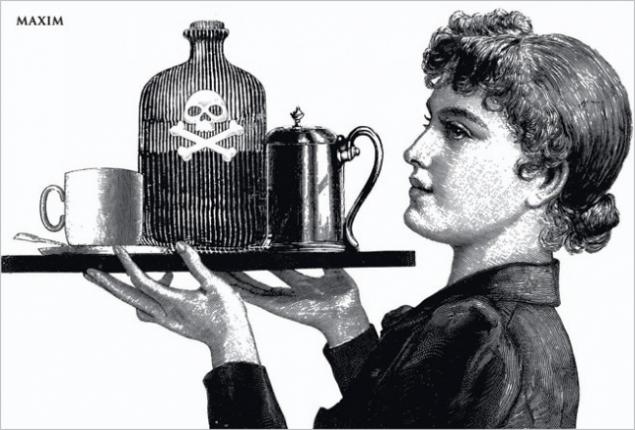
It would not be very clear how the process by giving to drinking is associated with the concepts of "likely" and "guaranteed" if not preserved lists of criminal jargon XVIII-XIX centuries, in which the expression "to drink" means a synonym for the word "poison". For poisoning - it really is one of the most reliable and safe ways to get rid of the killer interfering person.
"One iota" Iota - is the letter of the Greek alphabet indicating the sound [and]. She was depicted in the form of tiny bars, and very often lazy scribes just throwing it out of the text, as already whit could always understand what is at stake. We do not put points on the "e", right? The author of the phrase is Jesus Christ, who promised the Jews that the law does not change "one iota", that is to be excluded, even the most insignificant change.
"It smells like kerosene" Yes, we, too, at first thought that these words - the usual phrase from the lexicon of the fire, which is examining the charred ruins, pushes version of arson. So: nothing like this! In aphorism has a very specific author - a famous journalist Mikhail Koltsov, who published in 1924 in "Pravda" skit "All right." The feuilleton bichuyutsya mores of American oil magnates, to and fro handing out "smelling kerosene" bribes.
"Alive, smoking!»
The famous expression, which everyone knows that it belongs to the poet Pushkin, in fact does not belong to Pushkin. It prigovorka of the once popular children's game. Children standing in a circle, quickly passed each other a burning splinter and sang: "Alive, alive smoking room! Still alive smoking room! "The same accident, in whose hands the extinguished smoking room, I was considered a loser and had to perform some stupid and sometimes unsafe job - for example, pour opposing Amalie Yakovlevna snuff in the nightcap.
"Piano in bushes" But this phrase is actually the author. She was taken from Gorin became famous sketch and Arkanov "Quite by accident." In this skit portrayed humorists principles of reports on Soviet television. "Let us come to the first passerby. This pensioner Seregin, drummer labor. In his spare time he likes to play the piano. And just by chance in the bushes a piano on which Stepan play us Polonaise Oginski ».
"The Passion-cheeky" The word was popularized by Gorky, named one of his stories. But Gorky, which is not distinguished by the ability to verbal delights, not invented it himself, and pulled out of upbeat folk lullaby which sounds entirely:
will come Passion-cheeky,
Lead with Adversity,
They lead Adversity,
Izorvut heart apart!
Oh, the trouble! Oh, the trouble!
To hide where? Em>
In general, if "Good night, kids!" Finally decide to change his song-saver, we have something to offer them.
"Dance of the stove"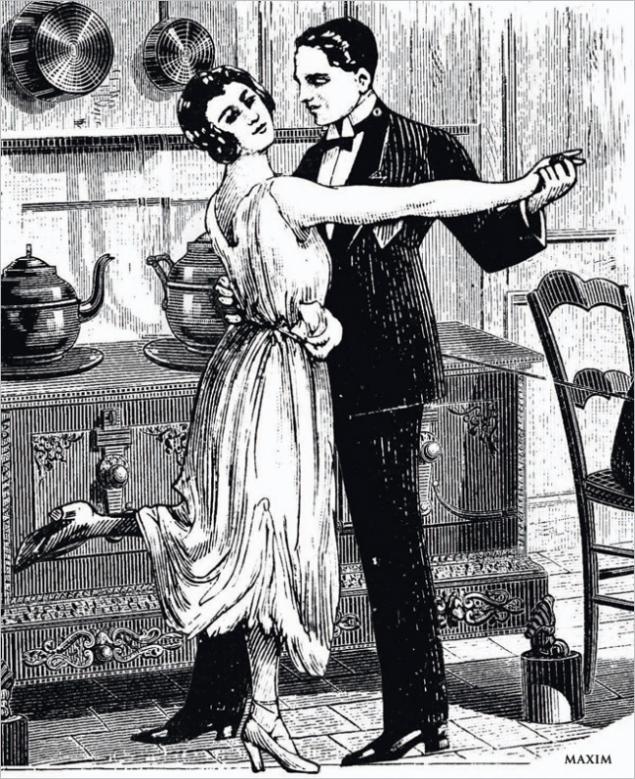
And here we have a little bit sad but instructive example of how the whole of the writer is left almost nothing. Here's something to say the name of Basil Sleptsova? Do not worry, you're not alone. Sleptsova today know only erudite specialists in Russian literature. He just was not lucky: he was born and lived along with Tolstoy, Dostoevsky, Turgenev and others. That left from Sleptsova in people's memory three words.
In the novel, "A good man," the hero recalls how as a child he was tormented dance lessons - put the stove and forced to go to a dance-step through the hall. He then skosolapit, it will turn a sock - and again he is being driven to dance on the stove.
"Useless scrap of paper"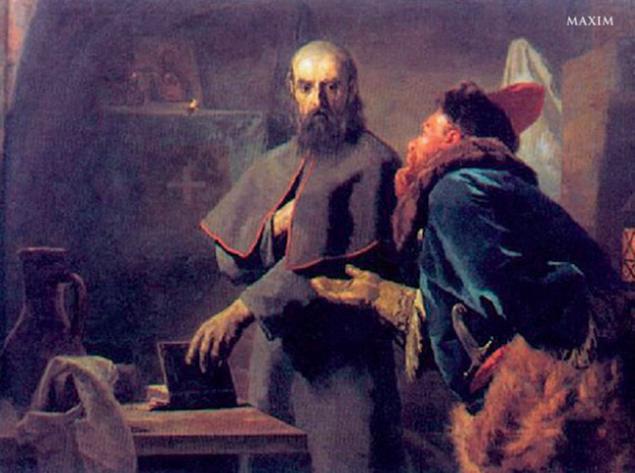
Unlike Trishka a caftan or Kuzka his mysterious mother, Shary - it is a historical personality. It is the head of the Russian Orthodox Church, Metropolitan of Moscow Philip II. He was a man of short-sighted, have forgotten that the first responsibility of the Moscow high priest is diligent giving of Caesar to Caesar, and that's hollow on the trouble with the king-priest Ivan the Terrible.
Want, you know, to expose the atrocities of the tsarist regime - began to write true stories about how many people the king tortured, tortured, Pozega and slack. The king called the mitropolitovo writing "useless scrap of paper," I swore that all Shary lying, and imprisoned Filka a distant monastery, where the Metropolitan almost immediately and finished off who sent the killers.
"Sly"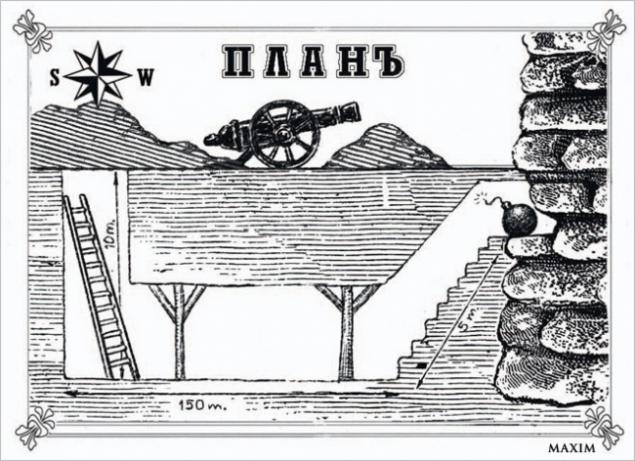
Sapa - is taken from the French term for the Russian army mine, bomb, as well as any blasting. Quiet sap was known as a tunnel under the walls of the besieged city, or to strengthen the enemy camp. Such a tunnel engineers conducted discreetly, usually at night, to the subsequent loud boom was the perfect opponent for a surprise.
"La Boheme"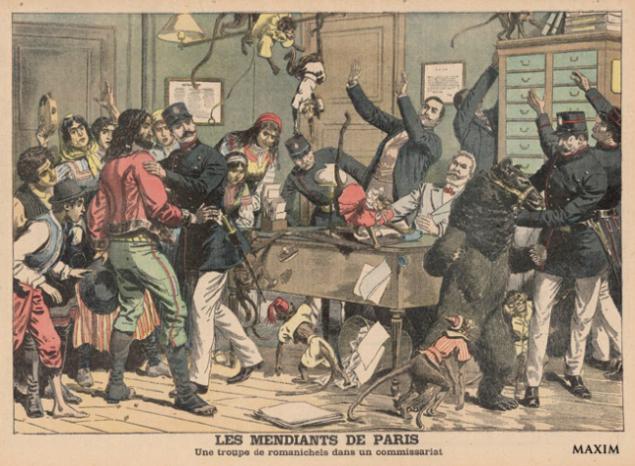
Creative intellectuals, beautiful life, glamor and other receptions - all this has nothing to do with Bohemia. This bohemian, which meant Parisians eating these things the word - is the lack of housing and employment, a lot of children, a drunken wife in the arms of the guests, no regime throughout the trash, mess, mess and dirty fingernails. Because the word "Bohemian" means "gypsy", and the Russian language "La Boheme" perfectly accurately translated as "gypsy».
"Nerd" Word sometimes jump from sense to sense, like lions on pedestals trainer, and sits in the most unexpected combinations. Here, for example, he was a French doctor by the name of Chretien, which means "Christian." Not that often, but not too rare last name (we won a whole class peasants, that is, Christians, called).
But this is the first time the doctor has managed to formulate a diagnosis "syndrome of congenital thyroid deficiency." From now on, the disease became known by the name of the scientist "cretinism" and patients, respectively, cretins. That is, Christians.
"Suffer garbage"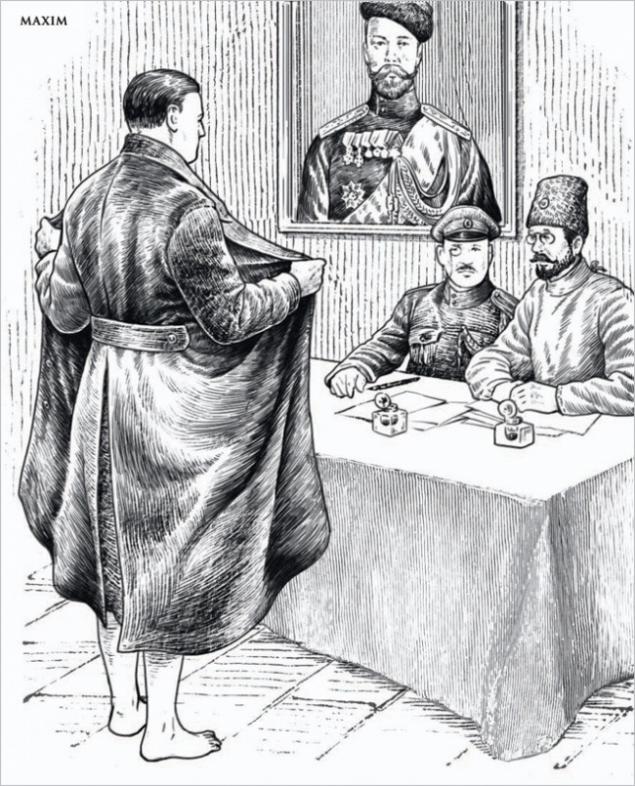
Maybe we will have trouble because of what we have in this edition of his pious offensive wrote. Although, if you find out anything improper in the word "dick" no. So he called in the Old Church Slavonic alphabet letter "x", as well as any cross-shaped "X».
When cross crossed out unnecessary space in the text, it was called "poherit." Old alphabet with all the basics and beeches finally abolished at the beginning of the XX century, and the word "dick", coming from the use of, half a century has become synonymous with his short speech on the "x" (you know what). And at the same time it seemed indecent and common expressions with the same root - "to suffer garbage." Hernia in Latin means "hernia", and that this diagnosis is good military doctors often exposed children affluent burghers, who did not want to serve in the army.
Every fifth citizen conscripts in Russia in the late XIX century, regularly suffered garbage (the garbage farmers often could not afford, and zabrivali much more active).
"Places not so remote" in the "Penal Code" 1845 places links have been divided into "long-term" and "not so remote." The term "remote" is meant the Siberian province in the future Sakhalin under the "not too distant" - Karelia, Vologda, Arkhangelsk Oblast and some other places are located only a few days away from St. Petersburg.
via www.maximonline.ru
"Proshlyapil" This word, as well as the phrase "Hey, the hat!" Has nothing to do with hats, spineless intellectuals and other standard images that arise in our mind with you. The word is it in the vernacular speech straight from the Yiddish and a warped form of the German verb «schlafen» - «to sleep." A "hat", respectively, "Sonia razzyava." While you're here hats your suitcase drapes.
"Nonsense"

seminarians studying Latin grammar, it had serious scores. Take, for example, the gerund - a member of this venerable grammatical community, which in Russian is simply no.
Gerund - a cross between a noun and a verb, and the use of this form requires a knowledge of Latin in such a large number of rules and conditions, often straight from seminary studies carried off to the hospital with a brain fever. Instead seminarians became known as "nonsense" any boring, tedious and utterly vague nonsense.
"Nepuganye idiot" Most people suffering from congenital idiocy, have a feature that happy that they are difficult to scare (and to convince to use a spoon and buttoning his pants). Painfully staunchly they do not want to absorb any information from the outside.
The expression went for a walk with a light hand of Ilf and Petrov, who in his "Notebooks" enriched the world of aphorisms "Edge not frightened idiots. It's time to scare. " This name writers parodied a then very popular book Prishvina "In the land not frightened birds».
Incidentally, the word "idiot" is also a delightful origin. Two and a half thousand years ago in Greece "idiot" at public meetings were called polite citizens who are not engaged in politics, did not belong to any party, and led a quiet peaceful life. How much has changed since then.
"The Moor has done his work, the Moor can go" Somehow, most people (even those who have actually read Shakespeare) believe that these words belong to Othello strangled his Desdemona. In fact, Shakespeare's hero was someone else, but not a cynic, he probably would have hanged himself himself than blurt out such tactless over the corpse of his beloved.
The phrase that says another theater Moor - the hero of the play by Schiller "conspiracy Fiesco in Genoa." He helped the Moor conspirators to gain power, and after the victory realized that yesterday's colleagues do not care about his high bell tower of the Genoese.
"Casting pearls before swine"

The process of throwing rubbish in front of small glass pig - really a perfect idea in its senselessness. But in the original text of the Bible, from which scratched the phrase, neither of which beads out of the question. It says something about the people who drop in feeder pigs a precious pearl. Just once the word "gem", "beads" and "Pearl" is meant pearls, its different varieties. It is then pricked industry churning penny glass beads and called them beautiful word "beads».
"With a twist"

The image highlights - some little tidbits, which gives a sense of the severity and unusual - gave us personally Leo Tolstoy. It was he who first introduced into circulation the phrase "a woman with a twist." In his drama "The Living Corpse" one character says to another: "My wife was the perfect woman ... But what do you say? There were highlights - you know, in kvass highlight? - There was no play in life ».
"Last warning" If you were born before 1960, then you yourself well remember the origin of this expression, for it is never forgotten. But later generations have been deprived of happiness to watch the confrontation between the US and China at the turn of 50-60-ies of XX century.
When in 1958 China, angered by the fact that the US air force and navy support Taiwan, published an angry note, titled "The Last Warning", the world shuddered with horror and held his breath in anticipation of the third world. When seven years later, China has four published a note under the same name, the world howled with delight. Since, in addition to pieces of paper with the terrible words, China had nothing to oppose US, Taiwan still retained independence, which Beijing does not recognize so far.
"For sure"

It would not be very clear how the process by giving to drinking is associated with the concepts of "likely" and "guaranteed" if not preserved lists of criminal jargon XVIII-XIX centuries, in which the expression "to drink" means a synonym for the word "poison". For poisoning - it really is one of the most reliable and safe ways to get rid of the killer interfering person.
"One iota" Iota - is the letter of the Greek alphabet indicating the sound [and]. She was depicted in the form of tiny bars, and very often lazy scribes just throwing it out of the text, as already whit could always understand what is at stake. We do not put points on the "e", right? The author of the phrase is Jesus Christ, who promised the Jews that the law does not change "one iota", that is to be excluded, even the most insignificant change.
"It smells like kerosene" Yes, we, too, at first thought that these words - the usual phrase from the lexicon of the fire, which is examining the charred ruins, pushes version of arson. So: nothing like this! In aphorism has a very specific author - a famous journalist Mikhail Koltsov, who published in 1924 in "Pravda" skit "All right." The feuilleton bichuyutsya mores of American oil magnates, to and fro handing out "smelling kerosene" bribes.
"Alive, smoking!»
The famous expression, which everyone knows that it belongs to the poet Pushkin, in fact does not belong to Pushkin. It prigovorka of the once popular children's game. Children standing in a circle, quickly passed each other a burning splinter and sang: "Alive, alive smoking room! Still alive smoking room! "The same accident, in whose hands the extinguished smoking room, I was considered a loser and had to perform some stupid and sometimes unsafe job - for example, pour opposing Amalie Yakovlevna snuff in the nightcap.
"Piano in bushes" But this phrase is actually the author. She was taken from Gorin became famous sketch and Arkanov "Quite by accident." In this skit portrayed humorists principles of reports on Soviet television. "Let us come to the first passerby. This pensioner Seregin, drummer labor. In his spare time he likes to play the piano. And just by chance in the bushes a piano on which Stepan play us Polonaise Oginski ».
"The Passion-cheeky" The word was popularized by Gorky, named one of his stories. But Gorky, which is not distinguished by the ability to verbal delights, not invented it himself, and pulled out of upbeat folk lullaby which sounds entirely:
will come Passion-cheeky,
Lead with Adversity,
They lead Adversity,
Izorvut heart apart!
Oh, the trouble! Oh, the trouble!
To hide where? Em>
In general, if "Good night, kids!" Finally decide to change his song-saver, we have something to offer them.
"Dance of the stove"

And here we have a little bit sad but instructive example of how the whole of the writer is left almost nothing. Here's something to say the name of Basil Sleptsova? Do not worry, you're not alone. Sleptsova today know only erudite specialists in Russian literature. He just was not lucky: he was born and lived along with Tolstoy, Dostoevsky, Turgenev and others. That left from Sleptsova in people's memory three words.
In the novel, "A good man," the hero recalls how as a child he was tormented dance lessons - put the stove and forced to go to a dance-step through the hall. He then skosolapit, it will turn a sock - and again he is being driven to dance on the stove.
"Useless scrap of paper"

Unlike Trishka a caftan or Kuzka his mysterious mother, Shary - it is a historical personality. It is the head of the Russian Orthodox Church, Metropolitan of Moscow Philip II. He was a man of short-sighted, have forgotten that the first responsibility of the Moscow high priest is diligent giving of Caesar to Caesar, and that's hollow on the trouble with the king-priest Ivan the Terrible.
Want, you know, to expose the atrocities of the tsarist regime - began to write true stories about how many people the king tortured, tortured, Pozega and slack. The king called the mitropolitovo writing "useless scrap of paper," I swore that all Shary lying, and imprisoned Filka a distant monastery, where the Metropolitan almost immediately and finished off who sent the killers.
"Sly"

Sapa - is taken from the French term for the Russian army mine, bomb, as well as any blasting. Quiet sap was known as a tunnel under the walls of the besieged city, or to strengthen the enemy camp. Such a tunnel engineers conducted discreetly, usually at night, to the subsequent loud boom was the perfect opponent for a surprise.
"La Boheme"

Creative intellectuals, beautiful life, glamor and other receptions - all this has nothing to do with Bohemia. This bohemian, which meant Parisians eating these things the word - is the lack of housing and employment, a lot of children, a drunken wife in the arms of the guests, no regime throughout the trash, mess, mess and dirty fingernails. Because the word "Bohemian" means "gypsy", and the Russian language "La Boheme" perfectly accurately translated as "gypsy».
"Nerd" Word sometimes jump from sense to sense, like lions on pedestals trainer, and sits in the most unexpected combinations. Here, for example, he was a French doctor by the name of Chretien, which means "Christian." Not that often, but not too rare last name (we won a whole class peasants, that is, Christians, called).
But this is the first time the doctor has managed to formulate a diagnosis "syndrome of congenital thyroid deficiency." From now on, the disease became known by the name of the scientist "cretinism" and patients, respectively, cretins. That is, Christians.
"Suffer garbage"

Maybe we will have trouble because of what we have in this edition of his pious offensive wrote. Although, if you find out anything improper in the word "dick" no. So he called in the Old Church Slavonic alphabet letter "x", as well as any cross-shaped "X».
When cross crossed out unnecessary space in the text, it was called "poherit." Old alphabet with all the basics and beeches finally abolished at the beginning of the XX century, and the word "dick", coming from the use of, half a century has become synonymous with his short speech on the "x" (you know what). And at the same time it seemed indecent and common expressions with the same root - "to suffer garbage." Hernia in Latin means "hernia", and that this diagnosis is good military doctors often exposed children affluent burghers, who did not want to serve in the army.
Every fifth citizen conscripts in Russia in the late XIX century, regularly suffered garbage (the garbage farmers often could not afford, and zabrivali much more active).
"Places not so remote" in the "Penal Code" 1845 places links have been divided into "long-term" and "not so remote." The term "remote" is meant the Siberian province in the future Sakhalin under the "not too distant" - Karelia, Vologda, Arkhangelsk Oblast and some other places are located only a few days away from St. Petersburg.
via www.maximonline.ru






